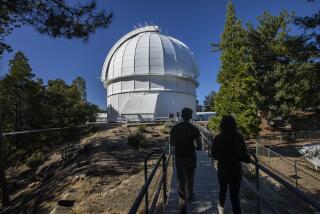John Bolton; Physicist Pioneered in Radio Astronomy
- Share via
John Bolton, pioneering radio astronomer and physicist who set up Caltech’s radio observatory in the Owens Valley four decades ago, has died in Australia. He was 71.
Bolton died July 6 in Buderim, in the state of Queensland, after a long illness, according to Tuesday’s Sydney Morning Herald.
The British native gained worldwide fame in 1948 when he identified radio sources from galaxies outside the one in which Earth is situated. He was part of an Australian team that identified the quasars.
Bolton moved to Caltech as a research fellow in astronomy, and in 1955 was appointed professor of physics and astronomy. He ultimately became director and played a key role in developing Caltech’s Owens Valley Radio Observatory.
Although the subject of his scrutiny may have seemed suspect in the 1950s, Bolton hastened to assure The Times in 1955 that none of the radio signals he was catching could come from extraterrestrial beings or even moving planets.
Signals he received, he said, were from fixed points where nature created rays similar to those from radios. The most intense radio “stars,” he said, might not actually be stars, but rather agitated gases.
Because radio stars could be located through fog or darkness, he told The Times, “if equipment could be made less bulky, it might become possible to automatically guide a missile over the poles from some radio star.”
Born in Sheffield, Bolton studied at Cambridge University and developed an interest in radio astronomy while serving as a radar officer with Britain’s Royal Navy in World War II.
He emigrated to Australia after the war, and returned there permanently in 1961 after leaving Caltech.
Bolton established Australia’s National Radio Observatory in Parkes in the state of New South Wales, and was in charge of its support for the Apollo moon missions from 1969 to 1973. He retired in 1981.
He is survived by his wife, Letty.





